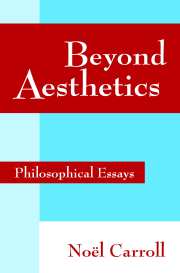Book contents
- Frontmatter
- Contents
- Foreword by Peter Kivy
- Introduction
- PART I BEYOND AESTHETICS
- PART II ART, HISTORY, AND NARRATIVE
- PART III INTERPRETATION AND INTENTION
- PART IV ART, EMOTION, AND MORTALITY
- PART V ALTERNATIVE TOPICS
- On Jokes
- The Paradox of Junk Fiction
- Visual Metaphor
- On Being Moved by Nature: Between Religion and Natural History
- Emotion, Appreciation, and Nature
- Notes
- Index
The Paradox of Junk Fiction
Published online by Cambridge University Press: 19 January 2010
- Frontmatter
- Contents
- Foreword by Peter Kivy
- Introduction
- PART I BEYOND AESTHETICS
- PART II ART, HISTORY, AND NARRATIVE
- PART III INTERPRETATION AND INTENTION
- PART IV ART, EMOTION, AND MORTALITY
- PART V ALTERNATIVE TOPICS
- On Jokes
- The Paradox of Junk Fiction
- Visual Metaphor
- On Being Moved by Nature: Between Religion and Natural History
- Emotion, Appreciation, and Nature
- Notes
- Index
Summary
Perhaps on your way to some academic conference, if you had no papers to grade, you stopped in the airport gift shop for something to read on the plane. You saw racks of novels authored by the likes of Mary Higgins Clark, Michael Crichton, John Grisham, Danielle Steel, Sidney Sheldon, Stephen King, Sue Grafton, Elmore Leonard, Sara Paretsky, Tom Clancy, and so on. These are the kinds of novels that, when you lend them to friends, you don't care, unless you live in Bowling Green, Ohio, whether you ever get them back. They are mass, popular fictions. In another era, they would have been called pulp fictions. Following Thomas Roberts, I will call them junk fictions, under which rubric I will also include things like Harlequin romances; sci-fi, horror, and mystery magazines; comic books; and broadcast narratives on either the radio or TV, as well as commercial movies.
There are a number of interesting philosophical questions that we may ask about junk fiction. We could, for example, attempt to characterize its essential features. However, for the present, I will assume that the preceding examples are enough to provide you with a rough-and-ready notion of what I am calling junk fiction, and I will attempt to explore another feature of the phenomenon, namely, what I call the paradox of junk fiction.
The junk fictions that I have in mind are all narratives. Indeed, their story dimension is the most important thing about them. Stephen King, for instance, makes this point by saying that he is primarily a storyteller rather than a writer.
- Type
- Chapter
- Information
- Beyond AestheticsPhilosophical Essays, pp. 335 - 347Publisher: Cambridge University PressPrint publication year: 2001
- 3
- Cited by



